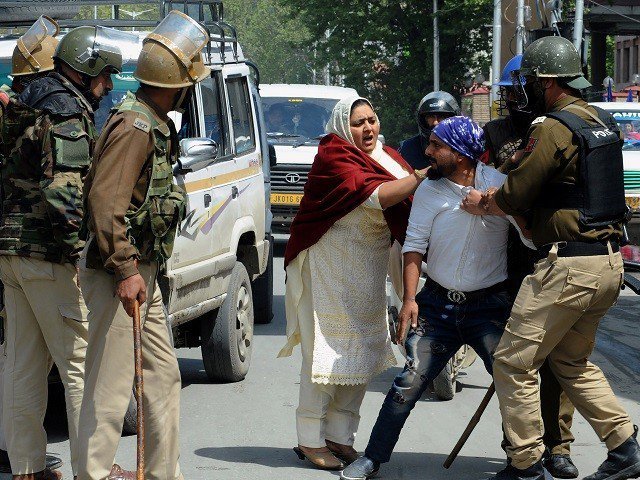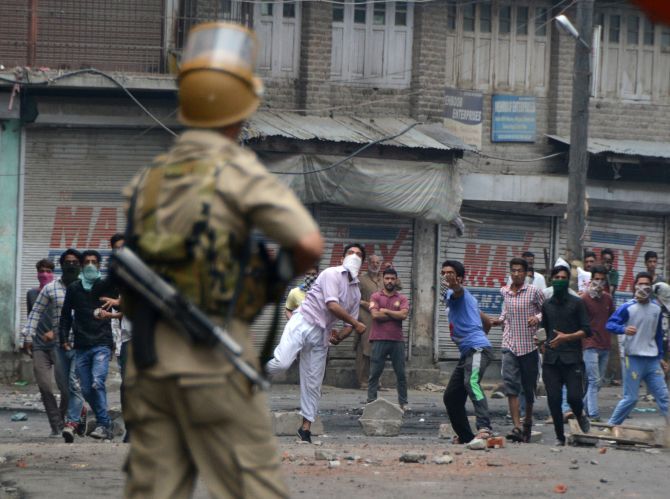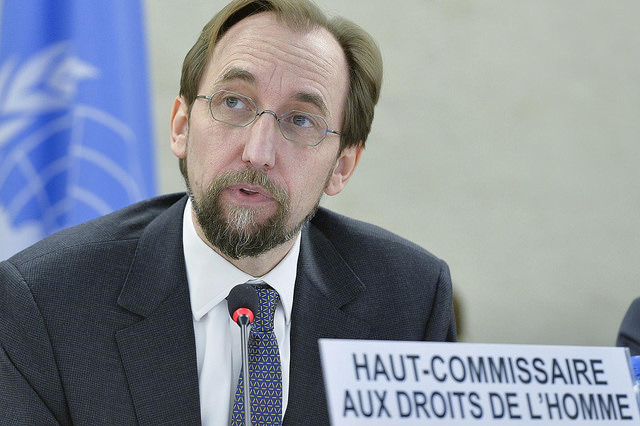Imposition of governor’s rule and the ongoing bloodshed in Indian occupied Kashmir (IoK) along with statements emanating from India about the a ‘crackdown’ on Kashmiris in IoK, indicate an alarming Indian imperviousness to international opinion, as it continues with its gross violations of human rights in IoK. Such steps are likely to result in enhanced Indian brutalities and a virtual free hand to Indian security forces against innocent Kashmiris. Past experience has also shown that the so-called Governor’s rule is one of the ploys adopted by New Delhi from time to time to further suppress the will of the Kashmiri people. The level of repression in IoK has already significantly gone up, while the Indian security officials are threatening even more stringent actions.
In a welcome surprise, the UN High Commissioner for Human Rights has recommended to HR Council to establish a “Commission of Inquiry” (COI) for international investigation into human rights violations in Kashmir. A COI is one of the UN’s highest-level probes, generally reserved for major crises. Due to Indian refusal for direct access, the report is based on remote monitoring. The main focus of the report is on human rights situation in the Indian occupied Kashmir (IoK), from July 2016 to April 2018. The report has stated that according to HR activists’ estimates, up to 145 civilians were killed by security forces and up to 20 civilians killed by armed groups in the same period.
The report accuses India of ‘unlawful killings’ in Kashmir and urges provision of right to self-determination. The contents, scale and the narrative of killings, maiming, abuse and impunity articulated in the report is a reaffirmation of what Pakistan has long highlighted to the comity of nations. OHCHR’s Report has rightly called for a final political solution of the Jammu and Kashmir dispute through meaningful dialogue that includes the people of Kashmir. On the broader Kashmir dispute between India and Pakistan, the UNSG Spokesman Farhan Haq said that the UN chief has consistently called for the resolution of the decades-old problem.
The report has called for an urgent need to address past and ongoing human rights violations and abuses and deliver justice for all people in Kashmir. The report said that people of Kashmir had been suffering a conflict for seven decades that had claimed or ruined numerous lives. However, the ground reality is that India does not give a damn such reports. To supplement its over 6 million IoK stationed security forces, India is raising additional two women battalions for Kashmir police.

India continues to ignore legitimate demands by various reputed domestic and international HR watch dog entities for probe into gross and systemic violations, including permanent blinding of over 1000 youth due to pellet gun injuries, excessive use of force, arbitrary arrest and detentions as well as continued sexual violence; alongside undoing of comprehensive impunity enjoyed by Indian security forces under the (il)legal cover of nearly a dozen draconian laws.
Pakistan has welcomed the proposal to establish a COI for international investigation into human rights violations. India, on its part, has rejected the call by the report for obvious reasons. “It is a selective compilation of largely unverified information. It is overtly prejudiced and seeks to build a false narrative,” the Indian External Affairs Ministry said in a statement. “The report violates India’s sovereignty and territorial integrity. The entire state of Jammu and Kashmir is an integral part of India,” it claimed. “Pakistan is in illegal and forcible occupation of a part of the Indian state through aggression.” The dissociation of India from reality is alarming. Indian attempts to exploit and cash in on the international environment by labelling the legitimate Kashmiris struggle as terrorism makes a mockery of the victims of actual terrorism and is reprehensible. If it really has nothing to hide, India can address its claims of the report being based on unverified information by allowing the COI and OIC IPHRC access to IOK.
Commissioner Zeid Ra’ad Al Hussein has urged the UN HR Council to consider establishing a COI: “to consider establishing a Commission of Inquiry for a more comprehensive investigation of the human rights situation in Kashmir and reiterate my calls for access Alleged sites of mass graves in the Kashmir Valley and Jammu region should be investigated. I am tremendously saddened by the assassination last week of Shujaat Bukhari, a courageous human rights defender actively working for peace, including through his participation in the Track Two diplomacy seeking to help both India and Pakistan put an end to the violence”.
The tragic and brutal killing of Kashmiri journalist Shujaat Bukhari Editor-in-Chief of the Rising Kashmir by unknown gunmen outside his office in Srinagar on 14 June 2018 gave a serious blow to international human rights and freedom of expression. His assassination due to his unremitting efforts for the Kashmiri cause will be remembered forever and is a clear manifestation of Indian state terrorism. Shujaat Bukhari’s brutal murder by Indian forces is a reflection of the intolerance of Indian state apparatus that wants to stifle freedom of speech and expression. The Indian government remains fearful of international exposition of the brutalization of occupied Jammu & Kashmir. India can run, but can it hide? This remains to be seen.
Shujaat Bukhari’s targeted killing, within hours of his tweet on the OHCHR’s report on Jammu & Kashmir, raises serious questions about the motivation behind his murder. Indian attempts to politicize his death and to deflect attention, not only from the Indian atrocities in IoK, but also the very real threat faced by independent journalists in India, when they differ from the government’s stance, are condemnable. Shujaat Bukhari was renowned for carrying out his professional responsibilities with courage and conviction. He was a vocal voice that consistently spoke out against the human rights abuses in Indian Occupied Jammu & Kashmir and strongly advocated the need for the peaceful resolution of the Jammu & Kashmir dispute. Shujaat Bukhari has joined the ranks of thousands of Kashmiri martyrs who have made the ultimate sacrifice for the cause of peace and justice for the people of Indian Occupied Jammu & Kashmir. Pakistan reiterates it call on the Government of India to conduct an independent, transparent and credible investigation into his murder and to bring the perpetrators to justice.
In his endorsement, UNSG Guterres has also stated that UN Human Rights Council must take next steps to address Indian rights abuses in Kashmir. He has held back his comments until the Council announces an international probe. Asked whether the secretary-general supports the recommendation by the UN High Commissioner for an independent international investigation into the serious abuses being committed by Indian security forces in Kashmir, a UN spokesman told a news briefing in New York that the proposal had been made to the HR Council and it was up to Council to “determine whether any steps were needed.”
According to the 49-page report, “In responding to demonstrations that started in 2016, Indian security forces used excessive force that led to unlawful killings and a very high number of injuries”. High Commissioner has denounced the lack of prosecutions of Indian forces in Jammu and Kashmir due to a 1990 law giving them what he called “virtual immunity”. The report clearly stipulates that its main focus is on the Indian Occupied Jammu & Kashmir. Hence, references to human rights concerns in Azad Jammu and Kashmir (AJK) and Gilgit-Baltistan can in no way be construed to create a false sense of equivalence.

India’s unwillingness to engage in a dialogue process with Pakistan and suppression of Kashmiri aspirations for right of self-determination continue to endanger regional and international peace and security. The lasting solution of the Jammu & Kashmir dispute is an essential imperative for peace, security and stability of the region.
The report has rightly called for final political solution of the Jammu and Kashmir dispute through meaningful dialogue that includes the people of Kashmir. Pakistan has once again expressed readiness for a COI to visit both AJK and IoK. India has again backed out. The isolation of India in the international community is complete. The skeletons in Indian closet are growing in numbers and size. UN has a key role to play in the resolution of the Jammu and Kashmir dispute.
The OCHCR report is a reminder of this internationally recognized dispute and the urgency of its settlement, both to protect human lives and promote peace. Being custodian of over a dozen UNSC resolutions spanning 1948-98, the UN has a duty to discharge with regard to settlement of one of oldest dispute on its agenda, hopefully OCHCR report will stimulate the stake holders to jump start the process towards that end. Permanent members of Security Council must put in their collective effort for resolving this humanitarian issue. The international community must ensure an expedited establishment of the Commission of Inquiry, to ensure that the Human Rights Charter is not reduced to meaningless words.




